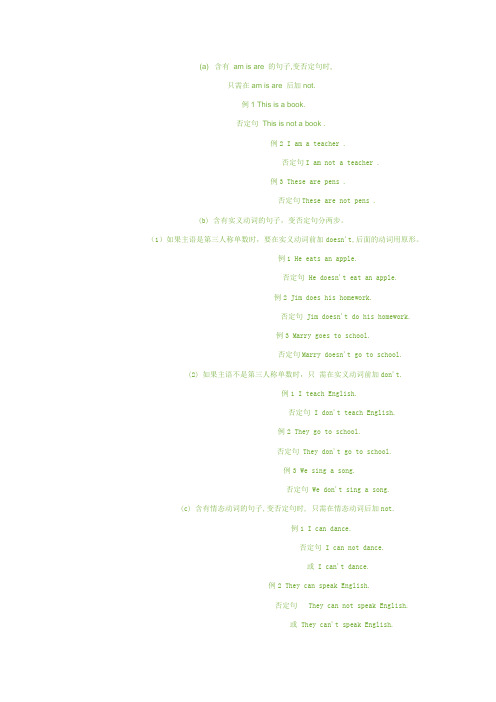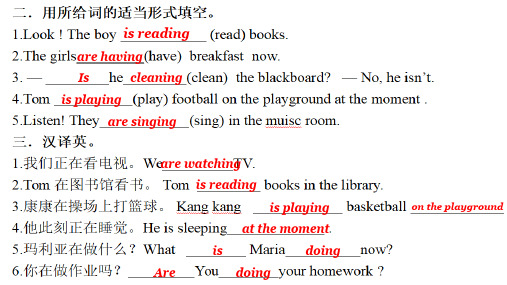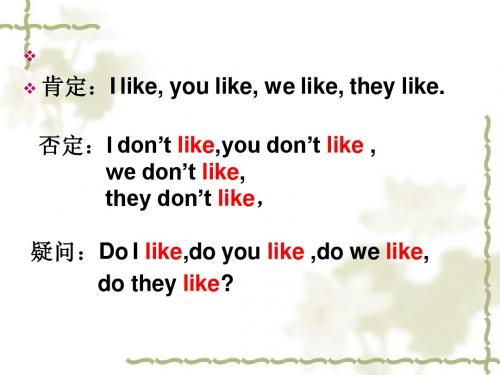一般现在时的否定句例子10个
一般现在时否定句

一、按照要求改写句子(1)含行为动词的否定句:don’t/doesn’t+动词原形1. Daniel watches TV every evening.(改为否定句)_______________________2. I do my homework every day. (改为否定句)_____________________________________3. She likes milk. (改为否定句)___________________________4. Amy likes playing computer games. (改为否定句)____________________________________________________5. We go to school every morning.(改为否定句)____________________________6. He speaks English very well.(改为否定句)________________________7. I like taking photos in the park. (改为否定句)___________________________8. John comes from Canada. (改为否定句)____________________________9. Simon and Daniel like going skating.(改为否定句)_____________________________________________________12. I have many books. (改为否定句)_________________________13. Gao Shan's sister likes playing table tennis.(改为否定句)14. She lives in a small town near New York.(改为否定句)15. I watch TV every day. (改为否定句)___________________________16. David has got a goal. (改为否定句)_________________________17. We have four lessons.(改为否定句)____________________________18. Nancy runs fast. (改为否定句)_________________________19. My dog runs fast. (否定句)______________20. Mike has two letters for him.(否定句)________(2)含be 动词的否定句:isn’t / aren’t / am not+名词/形容词1. She is always a good student. (改为否定句)2. He is a student. (改为否定句)3. I am tall. (改为否定句)4.We are from Guangzhou. (改为否定句)5.Lily and Mary are very friendly. (改为否定句)三、填空题目1.She ______( not do) homework every day.2.Jack ______( not go) home by bike.3.The monkey ______(not climb) up the tree every day.4.Her mum ______(not run) to the goose.5.He______(not do )like apple.6,Sam______(put) it under his arm.7. .He______(not like ) apple.8.Kitty______(not watch)TV everyday.9.He______(not feed)them at 8:00 every morning.10. Grandma Wang___(not live) in Pudong.11. They ______(not have) the same hobby.12.We (not watch)TV on Monday.13. Nick _________(not go) to the zoo on Sunday.14. They (not like) the World Cup?15. He often ________(not have) dinner at home.16. Daniel and Tommy _______( not be) in Class One.17. Liu Tao _______(do) not like PE.18. The child often _______(watch) TV in the evening.19. Su Hai and Su Yang _______(have) eight lessons this term.20. She _______(go) to school from Monday to Friday.21. I usually (not play) football on Friday afternoon.22. Sun Yang usually (not wash) some clothes on Saturday.23. Mingming usually(not water) the flowers every day.24. Tom (not do) his homework at home.五、单选题目。
一般现在时变否定句的规则

(a) 含有am is are 的句子,变否定句时,只需在am is are 后加not.例1 This is a book.否定句This is not a book .例2 I am a teacher .否定句I am not a teacher .例3 These are pens .否定句These are not pens .(b) 含有实义动词的句子,变否定句分两步。
(1)如果主语是第三人称单数时,要在实义动词前加doesn't,后面的动词用原形。
例1 He eats an apple.否定句 He doesn't eat an apple.例2 Jim does his homework.否定句 Jim doesn't do his homework.例3 Marry goes to school.否定句Marry doesn't go to school.(2) 如果主语不是第三人称单数时,只需在实义动词前加don't.例1 I teach English.否定句 I don't teach English.例2 They go to school.否定句 They don't go to school.例3 We sing a song.否定句 We don't sing a song.(c) 含有情态动词的句子,变否定句时, 只需在情态动词后加not.例1 I can dance.否定句 I can not dance.或 I can't dance.例2 They can speak English.否定句They can not speak English.或 They can't speak English.例3 He must go home.否定句 He must not go home.或 He mustn't go home.例4 He must be on the playground.He can not be on the playground.析:当must be用来表示推测,有“一定”的含义时,否定式要用can not.例5 You must say something at the mecting.You needn’t say anything at the mecting.析:当“must+行为动词”用来表示“必须”的含义时,其否定式可用needn’t 或mustn't表示“不需要”,“不必”,语气委婉,must not表示“禁止”,“千万别”语气生硬。
英语四个基本时态的 肯定句变否定句

_M_r_s_.__L_i_a_n_d__K_i_t_t_y__a_r_e__n_o__t_i_n__a_b__ig__s_h_o_p__. ________ .
8. He is crying(哭) under the tree.
____H__e_i_s_n__o_t__c_r_y_i_n_g_(__哭__)___u_n_d_e_r__t_h_e__t_r_e_e__. _____ .
9. His birthday is on the twentieth of November.
The old man doesn’t do morning exercises(早操) every morning.
23. We are from China.
_________W___e__a_r__e_n__’t__f__r_o_m___C__h_i_n_a__.________ .
24. He goes to the library(图书馆) on Sundays.
_____H_e__d_o_e_s_n_’_t__g_o_t_o__th__e_l_ib_r_a_r_y__o_n_S_u_n_d_a_y_s_.____ .
25. They have a class meeting every week.
_T_h__e_y_d__o_n_’t__h_a_v_e__a__c_l_a_s_s_m__e_e_t_i_n_g__e_v_e_r_y__w__e_e_k_. .
各种时态的否定句

各种时态的否定句各种时态的否定句可以用以下方式构成:一般现在时的否定句:主语 + do not/does not + 动词原形例句:I do not like coffee.(我不喜欢咖啡。
)一般过去时的否定句:主语 + did not + 动词原形例句:She did not go to the party last night.(她昨晚没有去参加派对。
)一般将来时的否定句:主语 + will not + 动词原形例句:They will not come to the meeting tomorrow.(他们明天不会来参加会议。
)现在进行时的否定句:主语 + am/are/is + not + 动词-ing 形式例句:We are not watching TV right now.(我们现在不在看电视。
)过去进行时的否定句:主语 + was/were + not + 动词-ing 形式例句:He was not studying when I called him.(当我给他打电话时,他没有在学习。
)现在完成时的否定句:主语 + have/has + not + 过去分词例句:She has not finished her homework yet.(她还没有完成作业。
)过去完成时的否定句:主语 + had + not + 过去分词例句:They had not seen each other for a long time.(他们已经很久没有见面了。
)情态动词的否定句:主语 + 情态动词 + not + 动词原形例句:You should not eat too much junk food.(你不应该吃太多垃圾食品。
)希望以上回答能对您有所帮助。
一般现在时肯定句疑问句否定句

3. The girls dance after school every Tuesday.
__D_o__th_e__g_i_rl_s_d_a_n__c_e_a_f_te_r__sc_h_o_o_l_e_v_e_r_y__T_u_e_s_d_a_y_?_
is reading
are having
Is
cleaning
is playing
are singing
are watching
is reading
is playing
at the moment
is
doing
Are
doing
on the playground
are listening is watching is looking
- Yes, they ____d_o______.
把下列句子改成疑问句。 1. She plays the music on Wednesday.
__D_o_e_s_s_h_e__p_la__y_t_h_e_m__u_s_i_c_o_n_W __e_d_n_e_s_d_a_y__?_____
2. My father swims every day.
He goes fishing every day. 改为否定句 They usually feed the ducks in the park. 改为否定句 We often have a picnic on Sunday. 改为否定句
把下列句子改成否定句。 1. She plays the music on Wednesday. _________________________________________ 2. My father swims every day. _________________________________________ 3. The girls dance after school every Tuesday. __________________________________________ 4. He always takes photos. ____________________________________________ 5. My parent watches TV every day. ____________________________________________
一般现在时肯定与否定

肯定: 肯定:She likes, he likes, it likes,Mary likes.
否定:She doesn’t like, he doesn’t
like, it doesn’t like,Mary doesn’t like.
疑问: 疑问 Does she like,
does he like ,does it like, does MFra bibliotekry like?
以My friend为题,写一段话介绍一下你的朋友 Mona I have a good friend, Her first name is Mona. Her last name is Hand.She is 13 years old. She likes playing sports ,such as (例如)tennis and running. Her favorite subject (最喜欢的科目) is math, She likes ice cream for dessert. She likes salad,French fries and hamburgers very much.
同义句: 1.Can I help you?=What can I do for you? 2.How much is it?=What’s the price of it? 3.I see.我明白了=I understand . 4.I’ll take it.这东西我买了。 5.What would you like to have? 6.I would like to have some salad.
以my family为题,写一篇短文介绍你的家庭成员的爱好 There are five people in my family.This is my father,He likes sports and he likes broccoli. This is my mother, She likes red and she likes carrots. That is my brother, He likes soccer and he likes tomatoes.That is my sister, She looks like (长得像)my mother, she likes blue and she likes bananas very much,I look like (长得像) my father,I like salad. I have a happy family and I love them very much.
小学英语实义动词的一般现在时否定句
实义动词的一般现在时否定句借助于助动词does +not,一般缩写成doesn't,且动词还原肯定句:She goes to the park at the weekend.否定句:She doesn't go to the park at the weekend.请用括号里单词的适当形式填空。
否定句:1.She often _____ (not go) to the zoo on Sundays.2.We usually _____ (not get) up early in the morning.3.Sometimes he _____ (not go) to school by bus.4.The old man never _____ (not speak) English.5.The pen _____ (not write) well.6.The book _____ (not sell) well.7.They always _____ (not go) to bed at ten o’clock at night.8.He _____ (not be) always like that.9.Ten years _____ (not be) not a short time.10.One hundred yuan _____ (not be) too much for me.11.If you _____ (not like) that, you may choose another.12.Miss Smith _____ (not teach) English.13.We _______ (not watch) TV on Monday.14.Nick _______ (not go) to the zoo on Sunday.15.Mike and Li Lei _______ (not like) eggs.16.Fang Ming ______ (not like) rice at all.17.Bill speaks Japanese. He _______ (not speak) Chinese.18.He______ (not know) the teacher’s name.19.He________ his homework at school. (not do)20.He ______ speak English. He speaks Chinese. (not do)21.My father and mother ______ read newspapers on Saturday. (not do)22.I _______ (love) my parents.23.Will you come if he ______________ (not come)?24.They _______ (have) a party in the garden if it ____________ (not rain) tomorrow.25.He doesn’t feel well and _______ (not eat) any food this morning.26.It ________like that. (not do)。
动词的一般现在时否定形式
动词的一般现在时否定形式动词的一般现在时表示经常性、习惯性的动作或状态。
而否定形式则表示动作或状态的否定。
在英语中,构成动词的一般现在时否定形式通常需要使用助动词 "do" 的否定形式 "don't" 或 "doesn't" 加上动词的原形。
例如,我们可以将肯定句 "I play football every Saturday." (我每个星期六踢足球)转换成否定句 "I don't play football every Saturday." (我不每个星期六踢足球)。
同样地,第三人称单数的动词需要在否定形式中使用助动词 "does"的否定形式 "doesn't",例如 "He doesn't like swimming." (他不喜欢游泳)。
动词的一般现在时否定形式构成方法比较简单,但在实际运用时还需注意以下几点:1. 助动词 "do" 的否定形式 "don't" 和 "doesn't" 不可以省略,否则将改变句子的意思。
例如 "I don't play football every Saturday." (我不每个星期六踢足球)中的 "don't" 不可以省略,否则变成了断言 "I play football every Saturday." (我每个星期六踢足球)。
2. 动词的一般现在时否定形式常与时间状语连用,表示经常或习惯性的否定动作。
例如 "I don't eat meat." (我不吃肉)中的 "don't" 表示习惯性的否定动作。
一般现在时的陈述句,否定句
2.行为动词: DO 和DOES
行为动词do一般现在时第三人称单(he,she,it) 的构成规则:
1、一般动词,在词尾加 s ; 如: work--works, live--lives, play--plays, sing-- sings.
3.以辅音字母加Y 结尾的词,把Y变I 在加ES,读作[Z]
Study studies
fly flies
4.以辅音字母+O结尾的词,一般情况是在词尾加ES 读 作[Z]
go goes
do does
5.特殊情况:have
has
Ex1. 写出下列词的单三形式:
look; go; give; fly;
II 一般现在时的否定式
1.Be 动词的否定式: be + not
I am a teacher.
I’m not a teacher
You are a worker 否定句 You aren’t a worker
Sor.
We are friends.
have
looks; goes; gives; flies;
has
gets
EX2 1.Tom often___( get ) up at six in the morning
goes
2. The earth __( go) around the sun .
lives
3.Mary’s parent __(live ) in Beijing .
We go to work by bike.
I don’t like English.
She doesn’t like it very much.
一般现在时的四大句型
一般现在时的四大句型一般现在时是英语中最基础的时态之一,它用来描述现在正在发生的事情、经常发生的事情或者普遍真理。
在英语中,一般现在时有四种基本的句型,分别是肯定句、否定句、疑问句和特殊疑问句。
下面我们来看一下这四种句型的具体用法和例句。
一、肯定句肯定句是最基本的句型,它用来描述现在正在发生的事情或者经常发生的事情。
肯定句的结构是主语+谓语动词+其他成分。
谓语动词要用原形,即不带s或es的形式。
例句:1. I love reading books.(我喜欢读书。
)2. She plays basketball every day.(她每天都打篮球。
)3. They live in a big house.(他们住在一座大房子里。
)二、否定句否定句用来表示否定的意思,它的结构是主语+do/does+not+谓语动词+其他成分。
其中,do/does是助动词,用来构成否定句。
谓语动词仍然要用原形。
例句:1. I do not like coffee.(我不喜欢咖啡。
)2. She does not speak Chinese.(她不会说中文。
)3. They do not have a car.(他们没有车。
)三、疑问句疑问句用来询问信息或者确认某件事情是否属实。
疑问句的结构是助动词+主语+谓语动词+其他成分。
其中,助动词要根据主语的人称和数来选择,谓语动词仍然要用原形。
例句:1. Do you like pizza?(你喜欢披萨吗?)2. Does she live in New York?(她住在纽约吗?)3. Do they play soccer on weekends?(他们周末踢足球吗?)四、特殊疑问句特殊疑问句用来询问特定的信息,如时间、地点、原因等。
特殊疑问句的结构是疑问词+助动词+主语+谓语动词+其他成分。
疑问词包括what、where、when、why、how等。
例句:1. What do you do for a living?(你是做什么工作的?)2. Where does she usually go on vacation?(她通常去哪里度假?)3. Why do they always arrive late?(他们为什么总是迟到?)以上就是一般现在时的四种基本句型,它们是英语学习的基础,掌握好这些句型,可以帮助我们更好地表达自己的意思,也能更好地理解别人的话。
